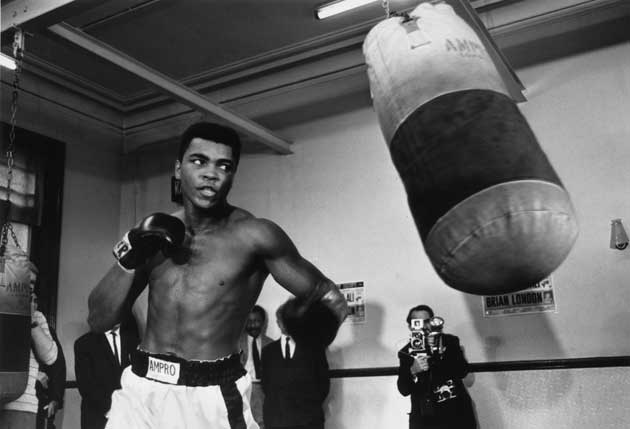Boxing: Tome on lord of rings is one to treasure
Pictorial essay of Muhammad Ali is reminder of man who still transcends sport, even if Smokin' Joe still smoulders

When Frank Warren announced that he had beaten his rivals to the punch by signing his trio of Olympians last week, he also revealed that the most serious offers had not come from promotional rivals in this country but the United States. As he pointed out, the Americans are desperate to lay their hands on British talent because they have so little of their own.
This is especially true of the big men. It is 24 years since an American won an Olympic gold medal at super-heavyweight (Tyrell Biggs in Los Angeles) and this year, when they did not even have a full team in Beijing, their only success was the bronze awarded to heavyweight Deontay Wilder, an unusual name but one likely to be quickly forgotten. Not that this is an obituary of heavyweight boxing or, yet, thankfully, of the one man who still transcends it.
Muhammad Ali was not someone to argue with, in the ring or out, so when he told the world he was The Greatest, we believed him, because he was. Perhaps not the greatest boxer – Ali himself always acknowledged that Sugar Ray Robinson held that title – but certainly the greatest world heavyweight champion and, as every opinion poll has ever indicated, the greatest sports figure in history. Even when the dancing years ebbed away and the famous shuffle became no longer a dazzling quickstep but a distressingly slow wobble, he remains the most recognisable human being on earth, and among the best-loved.
There has only really been one Lord of the Rings. More books have been written on Ali, who is 67 next month, than any single sports personality, and the latest of them is one to treasure.
The Official Treasures of Muhammad Ali, a £30 tome from Carlton Books, is the ideal Christmas box for the Ali-phile, a superb pictorial essay of his life from childhood to unparalleled celebrity. It contains pull-out keepsakes, including facsimiles of the first contract he signed with the all-white Louisville Group – as Cassius Clay – a personal letter from Bill Clinton, his address to the US Senate and other assorted memorabilia of programmes, tickets and billboards. It is a remarkable collection, which also features replica posters from the "Rumble in the Jungle" and the "Thrilla in Manila".
The latter is particularly apt in view of the recent controversial TV documentary about the brutal epic which regurgitated the bad blood between Ali and Joe Frazier, appearing to demonise Ali as a racist, a bigot who has never been forgiven by Frazier for trampling over his sensitivities and labelling him an Uncle Tom.
Unfortunately Ali cannot answer back, for the great irony is that while Parkinson's has not affected his brain, he struggles to get out the words that were once his trademark because his facial muscles are paralysed.
Ali was not flawless as a fighter or a man. He had his dark side, particularly in his early days of conversion to the Nation of Islam. He verbally derided other opponents, notably Floyd Patterson and Ernie Terrell, as cruelly as he did Frazier, but they took their lumps – and the money – because they knew he was not only endeavouring to psyche them but to sell tickets.
Smokin' Joe continues to smoulder with hatred of Ali because he claims he has never apologised or offered him respect. Yet what the documentary did not show was the moment in the dressing room after a fight Ali called "the closest thing to dying": Frazier's then 14-year-old son Marvis sat sobbing as Ali came in to offer his commiserations to his bruised and bleeding father. "What you cryin' for, boy?" he demanded of young Frazier. "It's cos my daddy got beat." Ali looked down at him. "You stop that, you hear. Your daddy lost nuthin' tonight. He's a winner, a champion. Just you remember that for the rest of your life."
In a half-century of sports writing, I have only once shed a tear. It was on the night of 2 October 1980, when in a stadium built in the car park of Caesars Palace in Las Vegas, an ageing Ali, out of shape and clearly unwell, was battered to defeat by Larry Holmes. Like Holmes himself, we pleaded with the referee to stop the fight, which Ali's trainer Angelo Dundee mercifully did at the end of the 11th round. The lumps in our throats were as large as the swellings covering the eyes that once twinkled so mischievously, and without real malice.
The last time we met was in London a few years ago when Ali received an award as Sports Personality of the Century. Ali always remembered your face, if not your name, and he placed a trembling hand on my shoulder as he leaned down to whisper. "It ain't the same any more, is it?" "No champ," I replied. "It ain't." Nor will it ever be.
Join our commenting forum
Join thought-provoking conversations, follow other Independent readers and see their replies
Comments